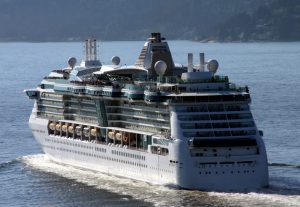Cruising is big business offering classic cruises, luxury cruises, adventure cruises, senior cruises, specialty events cruises, family cruises, river cruises, and more. Globally, an estimated 24 million passengers take to the seas each year. South Florida’s seaports alone had more than 9 million visitors last year. PortMiami, dubbed the largest, busiest cruise port, welcomed a record 5.34 million cruise passengers from Oct. 1, 2016, through Sept. 30, 2017.
events cruises, family cruises, river cruises, and more. Globally, an estimated 24 million passengers take to the seas each year. South Florida’s seaports alone had more than 9 million visitors last year. PortMiami, dubbed the largest, busiest cruise port, welcomed a record 5.34 million cruise passengers from Oct. 1, 2016, through Sept. 30, 2017.
Did you know that some ships can carry more than 9,000 passengers? It is a floating city. Unfortunately, thousands of passengers are injured on cruise ships each year. So, how do you ensure your safety and security while on a cruise? Here are some vacation safety tips to consider before booking your next cruise:
- Know the Laws and Research Your Ship – In 2010, the U.S. government passed a law called the Cruise Vessel Security and Safety Act to ensure the safety of passengers while on cruise ships. The law requires cruise lines to publicly report all deaths, missing persons, thefts, sexual harassments, and assaults. The law also requires cruise lines to provide passengers with guides that include a written summary which describes your rights and where to go and who to talk with if a crime is committed. The law has also improved safety features such as minimum ship rail heights and retrofitted cabins with safety features like security latches. Familiarize yourself with the important areas of the ship, including medical stations and safety devices.
- Be Medically Prepared – Check with the cruise line to ensure it has high standards for its on-board medical personnel and facilities. Ask if the ship has a properly licensed doctor. Have an ample supply of your prescription medications with you and bring a copy of your medical history. Also, check to see if your medical insurance is current and what it will and will not cover while on board or abroad. While on a cruise ship germs (food poisoning and norovirus) can spread quickly in confined areas, limit what you touch, always wash your hands, and carry antibacterial wipes and an alcohol-based, hand sanitizer.
- Participate in Muster Drills – Safety drills are important and required by all cruise ships. They educate passengers on what to do in the event of an emergency or evacuation. Locate your life jacket, try it on, and make sure is fits and is not defective. It is important that passengers pay close attention to the information as it is important for the passengers’ safety.
- Monitor Alcohol Intake – Cruise lines make most of their money on alcohol sales; therefore, alcohol is available virtually everywhere. Do not drink too much and never take a drink from a stranger. Watching your alcohol intake can help prevent injuries as well as possibility of other incidents, including falling overboard.
- Keep an Eye on Your Kids – Monitor your children at all times; this includes teens, and do not let them wander off on their own. Two-way radios are a great way to stay in touch, and designate times and locations for check-in during the day. Kids’ clubs and daycare services are a great option for overworked parents looking for some relaxation. Make sure you meet all the crew who will interact with your children and ask questions about their training and background checks.
- Be Aware of Off-Ship Excursion Dangers – While out and about exploring, take the usual precautions. Do not travel alone, do not wander off, do not leave things unattended, do not flash signs of wealth, and be aware of your surroundings. Research the port or region you are going to before you go.
- Shortened Time Restraints and Location Limitations to File a Personal Injury Claim – Typically, the ticket or contract covers the time-frame within which passengers must place the cruise ship on notice of a personal injury claim and the location in which the lawsuit must be filed. Often times, the notice requirement is as short as one month. That is why it is more important than ever to seek immediate medical and legal help after a cruise injury.
When on a cruise, do not just assume you are safe and secure. You must be aware of your surroundings and you must be vigilant to avoid slipping or falling overboard, getting injured on an excursion, drowning or being assaulted. Common sense can be a life saver!


